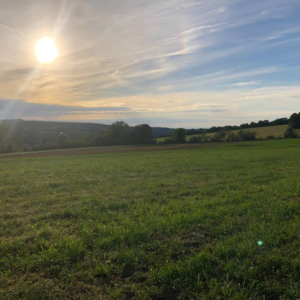Ploughing a Different Ground: Helping Farmers Unearth Wisdom through the Act of Listening

New Moon Farms in Munnsville, NY was one of 15 to participate in a farm consultation.
Courtesy of Sarah Ficken / New Moon Farms
In the minutes before a Baskets to Pallets farmer training begins, I stand at the front of the room, scanning tables of chattering people and taking in the many different faces. These trainings are geared toward farmers and producers who are experienced in direct-marketing, but who are considering expanding into wholesale markets. And yet, we often see brand new farmers sitting beside farmers who have been selling to wholesale channels for 20 years. We offer plenty of opportunities for participants to customize the learning experience to their own unique goals, such as hands-on activities and discussions, but I still wonder: “Will our attendees get what they need from this training? What they hoped for?”
Furthermore, while our trainings have plenty of advantages — attendees swap stories and reflect on challenges, share fellowship and enjoy local food — these trainings don’t offer a reflective space for participants to do a deep dive into their biggest hurdles. It seems to me that in the frenzy of our world, and particularly the demanding and busy nature of a farm business, the space for a quiet conversation about the concerns at hand is hard to come by.
The desire to provide this different sort of space inspired the recent work of our Baskets to Pallets cohort, a group of 14 agricultural service providers who are helping farmers enter new wholesale markets. We sent a broad invitation to all former attendees of Baskets to Pallets trainings, offering to match them with a cohort educator to talk about whatever challenges were presenting themselves at this moment in their farm business — at no cost to them. This invitation went out at the worst time possible — the peak of summer (due to a budget deadline) — and yet a total of 15 farmers and producers completed applications for support. At first, we called these “Farm Consultations,” but in my own experience these worked better as “Farm Conversations.” Eight educators on our cohort were matched with farmers according to their needs, and were free to approach these meetings in whatever way best suited both parties.
During the course of my own farm conversations, I found myself in farmhouse kitchens, porches, farm offices or on the phone — mostly listening. As an agricultural service provider, I’m often seen as a teacher or resource-keeper, but I came to realize that by stepping out of this role and offering myself as an attentive listener, a more trusting and open mood settled over these meetings. I came to embrace the role of listening and tried my best to ask searching, open-ended questions. I was surprised to discover that in many instances, these farmers and producers already had the answers they sought to the challenges they faced. But they were deep down and needed to be searched for and voiced to be unearthed.
Now, this reflection is not to devalue the accumulated experience agricultural service providers can offer. We have our own sphere of knowledge and resources, and there is often a place where these can be helpful. But I’m growing more aware that sometimes I offer ideas because I think that is expected of me as an educator. To remain quiet requires a certain self-confidence that it’s taken me a long time in this role to achieve. It also comes with the benefit of shifting my role from an authority who offers information or advice, to the role of a peer who respects and trusts the inner wisdom of the farmer who is immersed in the whole picture. There are often factors in that whole picture that the farmer knows well but are not immediately visible to the service provider. And it may be those hidden factors that change the entire story, factors that only the farmer can unearth.
As in so many areas of life, balance is good. There is a time and place for both talking and listening. But the realization that I don’t always need to have suggestions at the ready has given me a new lens through which to look at all of my work, and honestly, all of my life. It’s a new journey I’m just beginning.
And to my readers, I wish to say, thank you for listening.

